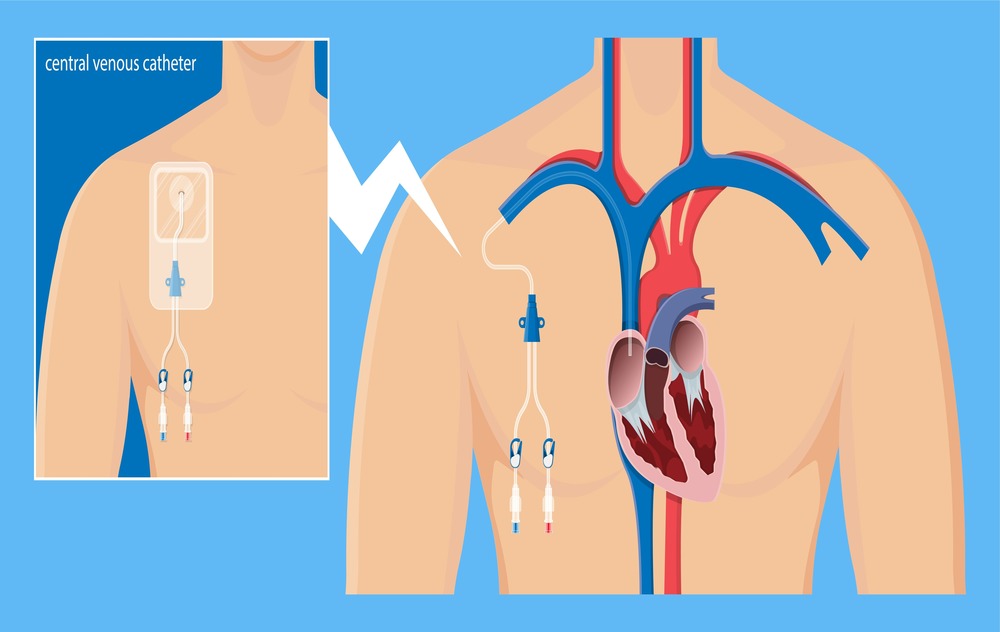A central venous catheter (CVC) is a long, flexible, y-shaped tube that is inserted through a central vein in your neck, chest, or groin to allow access to the bloodstream. These catheters allow medical professionals to easily take blood samples, provide medication, and deliver nutrients. There are two types of central venous catheters: tunneled and non-tunneled, with a few notable differences between them.
What Are Tunneled Catheters?
A tunneled catheter is a thin tube that is placed into a vein beneath the skin, allowing long-term access to the vein. A tunneled catheter is a thin tube that is placed into a vein but is then tunneled under the skin to anchor the catheter in place beneath the skin, allowing long-term access to the vein without any fear of being dislodged. This anchor under the skin is provided by a small cuff that allows tissue to grow around the catheter thereby providing stability to the catheter and preventing catheter movement. Most are placed in the neck but can also be placed in the groin, liver, chest, or back.
Tunneled catheters are selected for use when medical professionals need access to a vein over a long period of time (anywhere from a few weeks to several months). These catheters are favored to administer medications that could not otherwise be given through regular IV lines. Finally, tunneled catheters are far more comfortable for patients to receive medications, nutrition, and fluids as they alleviate the need for multiple repeated needle punctures to gain access into a patient’s vein.
What Are Non-Tunneled Catheters?
Non-tunneled catheters are commonly used for temporary venous access and may be placed into a large vein near the neck, chest, or groin. In emergency situations, a non-tunneled catheter provides easy access to the bloodstream and allows quick delivery of medicines and fluids. For long-term access, specialized non-tunneled catheters with valve mechanisms may also be used to help prevent infection and catheter-associated blood clots called thrombosis.
The Primary Differences Between Tunneled and Non-Tunneled Catheters
- Tunneled catheters are placed with a tract under the skin, whereas non-tunneled catheters are not.
- Cuffs are present on tunneled catheters, but not on non-tunneled catheters. A cuff is a small ring that wraps around the catheter and is placed beneath the skin. Once the tissue under the skin grows over the cuff, it helps to hold the catheter in place and prevents it from falling out.
- Tunneled catheters typically have a longer tract or tube inserted into the body, whereas non-tunneled catheters have a shorter tract.
- Tunneled catheters are used for long-term access, whereas non-tunneled catheters are typically designed for short-term access.
Peripherally Inserted Central Catheters
Peripherally inserted central catheters, also called PICCs or PICC lines, are another type of central venous catheter. Instead of being inserted into a vein located in the neck, chest, or groin, PICCs are inserted into a small, superficial, peripheral vein in the upper arm. After the catheter is initially placed into the patient’s arm, it is carefully threaded until its tip reaches a large vein near the heart. A PICC can be easily placed in an outpatient setting and most patients feel little to no discomfort during this minimally invasive procedure.
Leading-Edge Liver Cancer Treatments in New York
At USA Oncology Centers, our interventional radiologists are experts in providing minimally invasive procedures, such as the placement of tunneled venous catheters. With a catheter in place, chemotherapy and other treatments can be administered over a long period of time without the need for repeated needle insertions, greatly improving a patient’s quality of life.
Our goal is to provide patients with the best options for liver cancer treatment in New York that will relieve symptoms and increase their chances of survival. We offer office-based non-surgical treatments for both primary and secondary liver cancer, including the following:
At USA Oncology Centers, our patients always come first. To learn more about our treatment options, call us at 855.870.4747 or schedule an appointment with a qualified interventional oncologist.

